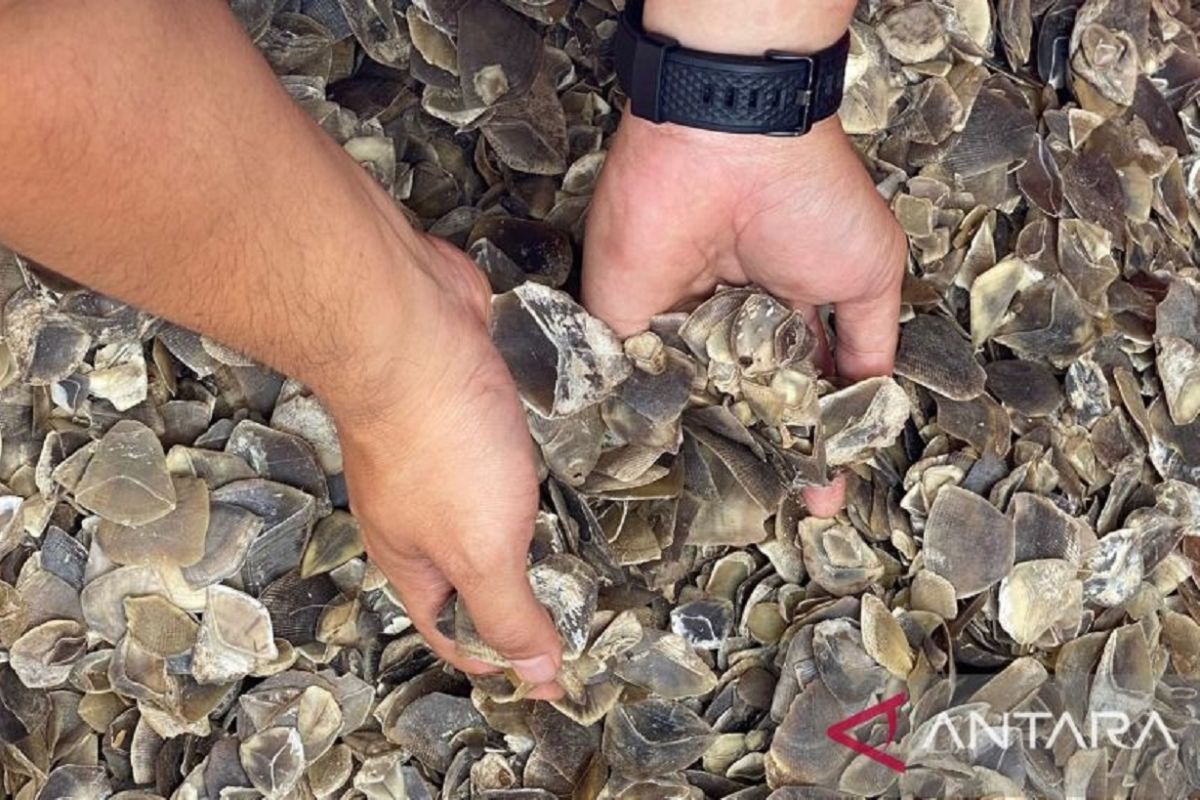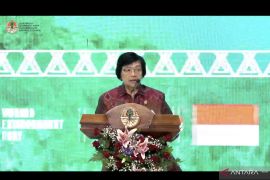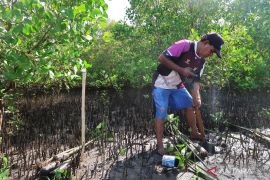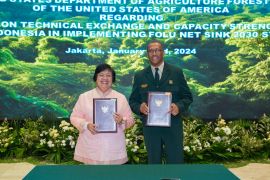In their quest for wealth, certain irresponsible humans are neglecting nature by incessantly and illegally trading the body parts of protected animals, such as the skins of Sumatran tigers, fangs of tigers and bears, scales of pangolins, and ivory from elephants.
This illegal trade is usually conducted on black markets or social media platforms. Some traders have also been trying to smuggle such goods abroad.
Law No. 5 of 1990 concerning the conservation of biotic natural resources and their ecosystems prescribes a maximum five-year prison sentence and a maximum fine of Rp100 million (US$6.3 thousand) for those indulging in such practices to deter them.
In June this year, officials from the Environment and Forestry (LHK) Ministry prevented three persons from selling two sheets of skin and two pairs of fangs of Sumatran tigers in Pelalawan district, Riau province.
An investigation revealed that the tiger skins were meant to be sold for Rp60 million (US$3.8 thousand).
In April last year, a joint team comprising officials from Riau Regional Police and Riau Natural Resources Conservation Center (BBKSDA) arrested three persons for allegedly transporting four elephant ivory pieces.
The joint team departed from Pekanbaru city to Kuantan Singingi district after receiving information from locals about the suspects, identified by their initials as YO, IS, and AC, who were caught transporting the ivory in a car.
The three suspects, who were residents of West Sumatra province, had bought the illegal items in Peranap sub-district, Indragiri Hulu district, Riau. They later admitted to obtaining the items for Rp90 million (5.6 thousand) from a trader, who is still on the loose.
More recently, in September this year, the Riau Police seized a travel car found transporting 41 kilograms of pangolin scales originating from Padang Sidempuan, North Sumatra, in Pekanbaru city.
The pangolin scales were meant to be traded for Rp3 million to 5 million (US$189–US$315) per kilogram in Pekanbaru.
According to Riau BBKSDA, the pangolin scales had been obtained by depriving as many as 40–50 pangolins of their right to live.
It should be noted that a further decline in the population of pangolins could disrupt the balance of the ecosystem and damage trees.
Pangolins can consume a large number of ants and termites, which are the main enemies of trees since they can damage roots and make trees lose their balance, in a single hunt. Hence, a further decline in the pangolin population could threaten the ecosystem.
Ineffective punishment
LHK Ministry’s acting director of prevention and seizure, Sustyo Iriyono, described the punishments regulated by Law No. 5 of 1990 as too weak to deter people from conducting trade in protected animals.
“Therefore, harsher sanctions are required for deterring perpetrators,” he stressed while attending the disclosure of the pangolin scale case at the headquarters of the Riau Police.
He opined that the maximum fine of Rp100 million is no match to the profits that can be gained by criminals through protected animal trade.
On September 26, 2023, a panel of judges at Blangkejeren District Court, Gayo Lues, Aceh province, sentenced a defendant, Kamilin, to 2 years in prison and awarded him a fine of Rp50 million (US$3.1 thousand) for trading in tiger body parts.
The panel of judges declared the defendant guilty of violating Article 40 Paragraph (2) of Law No. 5 of 1990, in conjunction with Article 22 Paragraph (2) point d of the law, in conjunction with Article 55 of the Criminal Code.
On April 13 this year, the former head of Aceh’s Bener Meriah district, Ahmadi, was sentenced to a year and a half in prison and slapped with a fine of Rp100 million for his involvement in the trade of Sumatran tiger skins.
It is quite rare to find perpetrators who trade in protected animals being given the maximum punishment, which has created an impression among potential perpetrators that they will only receive light punishments for killing and trading protected animals. Lawmakers need to pay special attention to this matter.
Currently, the LHK Ministry is striving to push for the finalization of a revision to the law to increase the severity of punishments for killers and traders of protected animals. The revision is expected to have a deterrent effect.
However, it has been 2 years since the formulation of the revision was begun. It is believed that the longer it takes to revise the law, the higher will be the number of protected animals falling into the hands of criminals.
Immediate measures for eliminating the trade and killing of protected animals are of the essence to ensure that the nation’s future generations can see living tigers, elephants, and pangolins, instead of learning about them from documentaries alone.
Commission IV of the House of Representatives (DPR), in particular, is expected to make all-out efforts to expedite the formulation of the revision.
Till a confirmed date for the revision’s ratification is not set, criminals will continue to hunt down protected animals and inflict damage to their ecosystems.
Therefore, it is crucial to threaten protected animal traders with harsher punishments in the hopes of preserving Indonesia’s biodiversity.
Related news: Ministry foils tiger skin trade in Jambi
Related news: Ministry reveals illegal trade of black-capped lories in South Papua
Related news: BKSDA confirms 31 animals rescued in illegal trade crackdown died
Translator: Riski M/Annisa F, Tegar Nurfitra
Editor: Azis Kurmala
Copyright © ANTARA 2023












